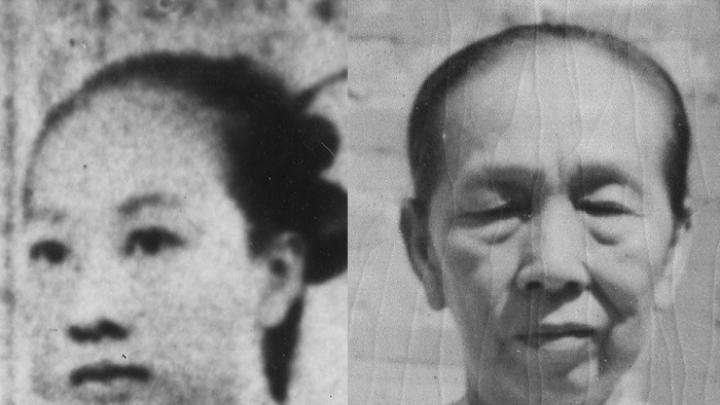One spring day in 1927, 18-year-old Nguyen Trung Nguyet took advantage of her parents’ absence to travel alone to Saigon, covering the 160 miles from Rach Gia by sampan, boat, and train. She called herself Bao Luong (“Precious Honesty”), the pen name she adopted when she began writing poetry under her father’s tutelage. At her age, most young Vietnamese women were expected to be married, but, raised in a patriotic family, she wanted to help overthrow French colonial rule. Such sentiment was running high then: a year before, students had been expelled from school for wanting to stage a national funeral for a noted reformer. Growing up at a time of strict sex segregation, when few girls received an education, Bao Luong was eager to fight for the emancipation of women and the liberation of her country.

Photograph courtesy of Hue-Tam Ho Tai
Nguyen Trung Nguyet (“Faithful Moon”) circa 1926, about a year before she left home to become a revolutionary activist under her pen name, Bao Luong ("Precious Honesty")
In Saigon, she lived with a relative whose husband, Ton Duc Thang, headed the southern section of the Vietnamese Revolutionary Youth League. (Headquartered in Guangzhou, China, the league had been created in 1925 by Ho Chi Minh as a first step toward forming a Vietnamese Communist Party; he judged that few Vietnamese then understood the meaning of revolution, or what kind of society to strive for.) After four months, during which her potential was surreptitiously assessed, Bao Luong was accepted for revolutionary training. With several male comrades, she stowed away on a boat, dressed as a boy, and arrived in Guangzhou that September.
Her single state nevertheless created awkwardness with her fellow revolutionaries; she was repeatedly urged to marry in order “to settle her status.“ But when Nguyen Bao Toan, the liaison between Guangzhou and activists at home, asked her to marry him, she refused. “Our generation cannot afford to think of love,” she explained. “The promise we must make is not of marriage but of commitment to the revolution.”
She returned to Saigon in late November and threw herself into the task of recruiting women into the league. Pretending to sell fabric, she traveled throughout the Mekong Delta, finding other young women who shared her feminism and patriotism. Ironically, they, like Bao Luong, enjoyed the full support of their families even as they called for the downfall of the patriarchal system: their revolutionary zeal owed much to family love and loyalty. To them, women’s emancipation meant access to formal education and freedom to choose their husbands. They hatched plans to campaign against colonial rule through pamphlets, demonstrations, and public speeches. “How about an assassination?” one asked.
A year later, an assassination occurred. A young recruit complained that she had been pressured by a senior league member to become his mistress. When he was criticized for this and other transgressions, he threatened to go to the Sûreté (police). Bao Luong chaired one of the meetings where the group decided to eliminate him, and her cousin was one of three men who carried out the deed. Her own role in the murder is ambiguous; in her memoir, which she wrote in old age, she is vague about her movements that day.
The Sûreté might never have learned who was involved in the “Barbier Street crime,” but revolutionary politics intervened. The murder preceded the refusal of southern members of the Revolutionary Youth League to disband and join the new Communist Party, whose program they did not know and whose effectiveness was unproven. Months later, a letter to the Sûreté betrayed the league members, including Bao Luong. She suspected her former suitor, Nguyen Bao Toan. Ordered to liquidate the league, he had put the revolutionary cause as he saw it above everything and everyone.

Photograph courtesy of Hue-Tam Ho Tai
Nguyen Trung Nguyet in the early 1970s
Bao Luong was incarcerated for months while the Sûreté tried to beat a confession out of her; she then spent a year in the Saigon Central Prison awaiting trial. At the trial, she objected fiercely to the slurs cast on her comrades by the French judges. Challenged to explain how she, as a woman, was oppressed under colonial rule, she retorted: “We women are the worst off. We are not allowed to go to school.” Her rebelliousness added another three years to the five years’ hard labor on which the judges had originally decided. Her cousin and two other men were condemned to death. Bao Luong was unrepentant: “Loving one’s country is not a crime,” she told her lawyer. She was undaunted by the prospect of prison: “She had only seven more years to go,” her memoir ends. “She had no reason to give in to self-pity.”
When Bao Luong was released in 1938, she married the male prison nurse who had cared for her as she suffered from maltreatment and malnutrition. As she had once explained to Nguyen Bao Toan, marriage was not compatible with revolution, and her own marriage put an end to her revolutionary career, for she believed in the traditional responsibilities of a wife and mother. Few who met her in old age could imagine that she had once been willing to go against accepted notions of female decorum for the sake of revolution and women’s emancipation. She died only a few months before the two halves of the country were united as the Socialist Republic of Vietnam, with her former mentor, Ton Duc Thang, as president. The woman who had endured torture so as not to betray her comrades took to her grave whatever regrets and remorse she might have felt.








